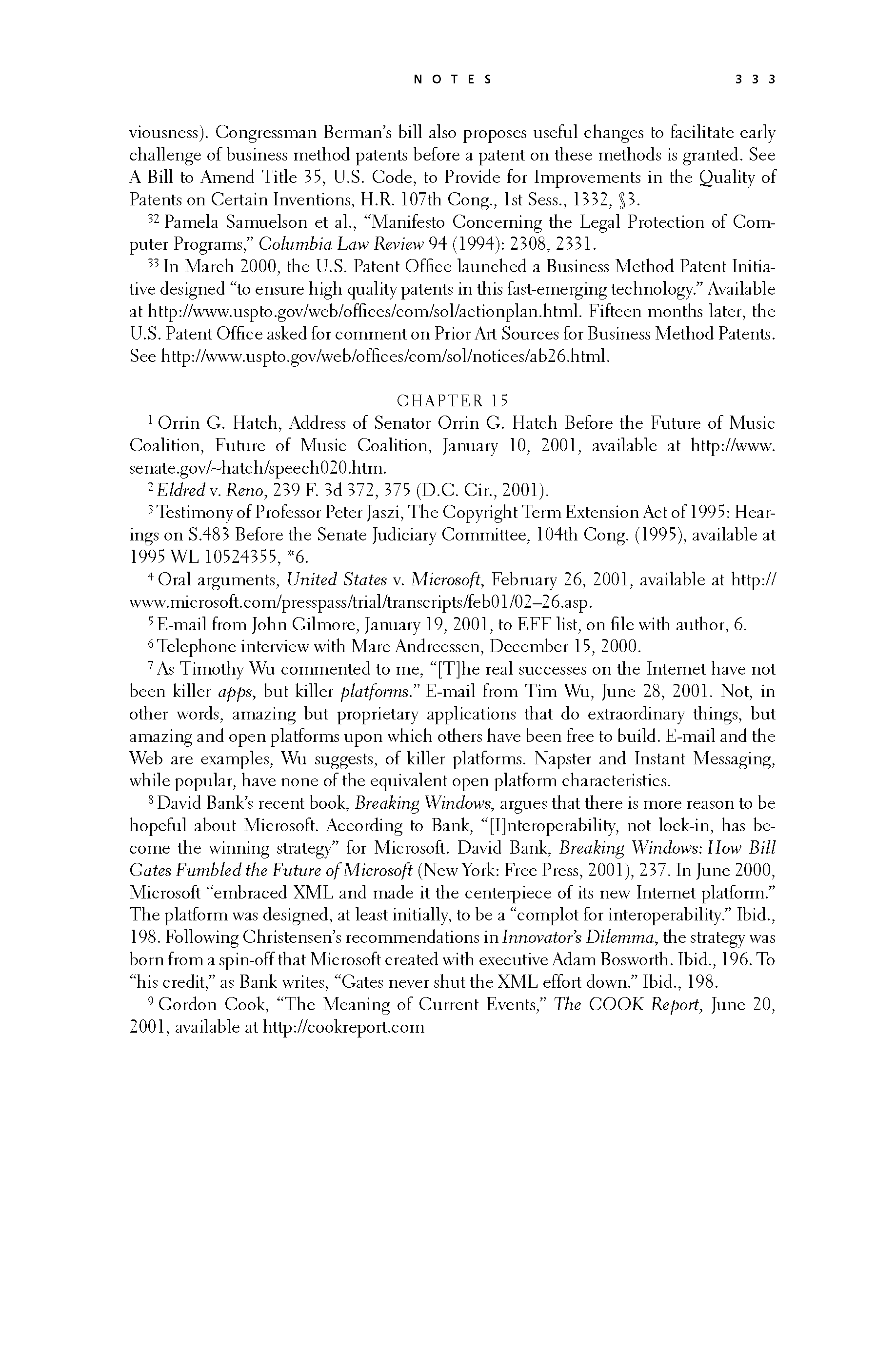 p332 _
-chap- _
toc-1 _
p333w _
toc-2 _
+chap+ _
p334
p332 _
-chap- _
toc-1 _
p333w _
toc-2 _
+chap+ _
p334
viousness). Congressman Berman's bill also proposes useful changes to facilitate early
challenge of business method patents before a patent on these methods is granted. See
A Bill to Amend Title 35, U.S. Code, to Provide for Improvements in the Quality of
Patents on Certain Inventions, H.R. 107th Cong., 1st Sess., 1332, #3.
[14-32] Pamela Samuelson et al., "Manifesto Concerning the Legal Protection of Com-
puter Programs," _Columbia_Law_Review_ 94 (1994): 2308, 2331.
[14-33] In March 2000, the U.S. Patent Office launched a Business Method Patent Initia-
tive designed "to ensure high quality patents in this fast-emerging technology." Available
at http://www.uspto.gov/web/offices/com/sol/actionplan.html. Fifteen months later, the
U.S. Patent Office asked for comment on Prior Art Sources for Business Method Patents.
See http://www.uspto.gov/web/offices/com/sol/notices/ab26.html.
Chapter 15
[15-1] Orrin G. Hatch, Address of Senator Orrin G. Hatch Before the Future of Music
Coalition, Future of Music Coalition, January 10, 2001, available at http://www.
senate.gov/~hatch/speech020.htm.
[15-2] _Eldred_ v. _Reno,_ 239 F. 3d 372, 375 (D.C. Cir., 2001).
[15-3] Testimony of Professor Peter Jaszi, The Copyright Term Extension Act of 1995: Hear-
ings on S.483 Before the Senate Judiciary Committee, 104th Cong. (1995), available at
1995 WL 10524355, *6.
[15-4] Oral arguments, _United_States_ v. _Microsoft,_ February 26, 2001, available at http://
www.microsoft.com/presspass/trial/transcripts/feb01/02-26.asp.
[15-5] E-mail from John Gilmore, January 19, 2001, to EFF list, on file with author, 6.
[15-6] Telephone interview with Marc Andreessen, December 15, 2000.
[15-7] As Timothy Wu commented to me, "[T]he real successes on the Internet have not
been killer _apps,_ but killer _platforms._" E-mail from Tim Wu, June 28, 2001. Not, in
other words, amazing but proprietary applications that do extraordinary things, but
amazing and open platforms upon which others have been free to build. E-mail and the
Web are examples, Wu suggests, of killer platforms. Napster and Instant Messaging,
while popular, have none of the equivalent open platform characteristics.
[15-8] David Bank's recent book, _Breaking_Windows,_ argues that there is more reason to be
hopeful about Microsoft. According to Bank, "[I]nteroperability, not lock-in, has be-
come the winning strategy" for Microsoft. David Bank, _Breaking_Windows:_How_Bill_
_Gates_Fumbled_the_Future_of_Microsoft_ (New York: Free Press, 2001), 237. In June 2000,
Microsoft "embraced XML and made it the centerpiece of its new Internet platform."
The platform was designed, at least initially, to be a "complot for interoperability." Ibid.,
198. Following Christensen's recommendations in _Innovator's_Dilemma,_ the strategy was
born from a spin-off that Microsoft created with executive Adam Bosworth. Ibid., 196. To
"his credit," as Bank writes, "Gates never shut the XML effort down." Ibid., 198.
[15-9] Gordon Cook, "The Meaning of Current Events," _The_COOK_Report,_ June 20,
2001, available at http://cookreport.com
[[333]]
p332 _
-chap- _
toc-1 _
p333w _
toc-2 _
+chap+ _
p334